Are Frenchies clingy dogs?
Curious about whether French Bulldogs are clingy dogs? Well, get ready to dive into the wonderful world of these bat-eared cuties who have stolen hearts all over the globe. Frenchies, as we fondly call them, are known for their unyielding loyalty and affectionate nature. But what exactly makes them so clingy?
With their charismatic personalities and mischievous antics, French Bulldogs have quickly become a favorite breed among households everywhere. They just can’t resist showering their owners with love and attention, which often leads to their clingy reputation.
These little bundles of joy thrive on human companionship and crave constant affection. They’ll follow you from room to room, their tiny paws tip-tapping behind like devoted shadows. But why are they like this? Let’s find out together.
There are a few factors that contribute to the clinginess of French Bulldogs. First off, they were bred to be companion dogs, so forming strong bonds with humans is in their DNA. This inherent need for social interaction means they yearn for your company 24/7 and feel anxious when left alone for too long.
On top of that, Frenchies have a naturally affectionate disposition. Their friendly and gentle nature combined with an eagerness to please makes them incredibly loving companions. They’ll do anything for cuddles, lap time, or belly rubs just to feel closer to you.

But here’s the thing – French Bulldogs also tend to be sensitive souls who don’t handle separation or changes in routine very well. They form deep emotional attachments and can get pretty distressed when you’re not around as much as they’d like. That’s why they resort to being clingy – it’s their way of making sure you’re always within reach.
Now, while having a Frenchie glued to your side can be heartwarming, it’s important to strike a balance. You don’t want to foster excessive dependence. Encouraging independence through gentle training and gradually increasing alone time can help create a well-rounded Frenchie who still adores your company but can also handle some solo adventures.
So, in conclusion, French Bulldogs have earned their clingy reputation fair and square. Understanding the reasons behind their behavior gives us insight into their deep need for affection and companionship. Their unwavering devotion, loyalty, and undeniable charm make them the ultimate sidekicks for
The History of French Bulldogs as Companion Dogs
Contents
- 1 The History of French Bulldogs as Companion Dogs
- 2 Signs of Separation Anxiety in Frenchies
- 3 Strategies for Helping Your Frenchie Become More Independent
- 4 Exercise and Mental Stimulation for French Bulldogs
- 5 Establishing Boundaries and Routines for Your Frenchie
- 6 Understanding the Causes of Clinginess in French Bulldogs
- 7 How to Create a Harmonious Relationship with Your Clingy Frenchie
- 8 Not All Frenchies are Clingy – Each Dog Has Its Own Unique Personality
- 9 Conclusion
In this blog post, we’ll delve into the fascinating history of French Bulldogs as companion dogs and explore the origins of their clinginess.
From England to France: A Journey of Love and Fashion
In the early 19th century, French Bulldogs were bred in England as smaller versions of the English Bulldog. They were initially prized for their ratting skills and became companions to lace workers in Nottingham. However, it was during the Industrial Revolution that Frenchies gained popularity and made their way to France. The breed’s charm captivated the upper class in France, especially Parisian shop owners and the bourgeoisie.
The Rise of French Bulldogs as Fashionable Companions
French Bulldogs quickly became a symbol of style and sophistication in France. Their small size, friendly temperament, and unique appearance made them sought-after companions for social outings and gatherings. Picture this: a French Bulldog trotting alongside its fashionable owner through the streets of Paris, turning heads with its irresistible charm.
The Velcro Dog Phenomenon
Today, French Bulldogs are often referred to as “velcro dogs” due to their tendency to stick by their owner’s side at all times. This clingy behavior is believed to stem from their history as companion dogs. Bred for centuries to provide affection and companionship, it’s no wonder they have an unwavering desire to be close to their loved ones.
Understanding Clinginess: Separation Anxiety or Personality?
While some may find their Frenchie’s clinginess endearing, others may find it overwhelming. It’s important to note that not all French Bulldogs are clingy, as each dog has its own unique personality. However, clinginess can also be a sign of separation anxiety. These dogs may become distressed when left alone, leading to heightened clinginess when their owners are present.
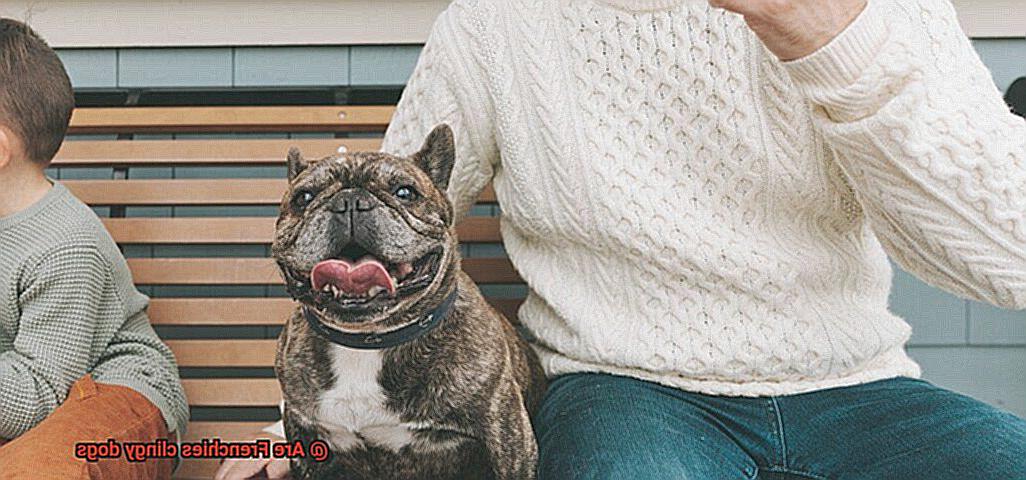
Tips for Managing Clinginess

If you have a clingy Frenchie, there are strategies you can employ to help them become more independent. Gradually increasing alone time, providing mental stimulation through toys and puzzles, and positive reinforcement training techniques can all reduce separation anxiety and clingy behavior. Regular exercise and establishing routines and boundaries are also vital for their well-being.
Signs of Separation Anxiety in Frenchies
French Bulldogs, also known as Frenchies, are adorable and affectionate companions. They thrive on human interaction and can develop separation anxiety when left alone. Separation anxiety is a condition where dogs become extremely distressed when they are separated from their owners or left alone. As a Frenchie owner, it’s important to recognize the signs of separation anxiety and take steps to help your furry friend cope with being alone.
- Excessive barking or howling: Frenchies with separation anxiety may bark or howl excessively when left alone. This is their way of expressing distress and trying to get your attention.
- Destructive behavior: Chewing furniture, scratching doors, or other destructive behaviors are common signs of separation anxiety in Frenchies. They may engage in these behaviors to cope with their anxiety.
- Indoor accidents: Frenchies may urinate or defecate indoors when they have separation anxiety. This is not a sign of disobedience, but rather a result of their distress.
- Pacing or restlessness: If your Frenchie is restless and paces around the house when you’re not there, it could be a sign of separation anxiety. They may also exhibit other signs of agitation, such as panting or drooling.
- Escape attempts: Some Frenchies with separation anxiety will try to escape from the house or yard in an attempt to find their owners. This can be dangerous and should be addressed promptly.
To help your Frenchie cope with separation anxiety:
- Crate training: Gradually introducing your Frenchie to a crate and associating it with positive experiences can provide them with a safe and secure space when you’re not around.
- Interactive toys: Leaving interactive toys or puzzles for your Frenchie can help keep them occupied and distracted while you’re away. These toys can provide mental stimulation and alleviate their anxiety.
- Behavior modification techniques: Desensitization and counterconditioning can be effective in reducing separation anxiety. This involves gradually exposing your Frenchie to short periods of separation and rewarding calm behavior.
- Professional help: In severe cases, medication prescribed by a veterinarian may be necessary to manage your Frenchie’s anxiety levels. However, medication should always be used as a last resort and in conjunction with behavioral therapy.

Strategies for Helping Your Frenchie Become More Independent
We all love the affectionate nature of our Frenchies, but sometimes it’s important for them to be able to handle being alone and become more independent. Whether you’re going back to work or just want your Frenchie to feel comfortable when you’re not around, here are some strategies to help them become more independent.
Gradual Separation
Start by gradually increasing the time you spend away from your Frenchie. Begin with short periods, such as leaving them alone for 15 minutes and gradually extending it to an hour or more. This will help them become accustomed to being alone and reduce their dependency on constant attention.
Create a Safe Space
Designate a specific area in your home where your Frenchie can retreat to when they need some alone time. This could be a crate, a cozy corner with their bed and toys, or a gated-off section of a room. Make sure this space is comfortable and stocked with their favorite things, so they associate it with positive experiences.
Practice Independence Exercises
Engage your Frenchie in activities that promote independence. Teach them basic commands like “stay” and “wait” so they learn to listen and follow instructions even when you’re not right beside them. Additionally, encourage them to play with interactive toys that keep them occupied and entertained without needing constant human interaction.
Gradual Socialization
Expose your Frenchie to different people, animals, and environments gradually. This will help them become more comfortable in new situations and reduce their reliance on you for security. Consider enrolling them in obedience classes or arranging playdates with other dogs to foster social interaction.

Encourage Solo Activities
Provide opportunities for your Frenchie to engage in independent activities. Offer puzzle toys or treat-dispensing toys that require problem-solving skills to keep them mentally stimulated while you’re away. This will divert their attention from your absence and encourage them to focus on the activity at hand.

Reward Independence
Whenever your Frenchie displays independent behavior, be sure to reward and praise them. Positive reinforcement will reinforce the idea that being independent is a desirable trait. Use treats, verbal praise, or a favorite toy to show your appreciation for their independent actions.
Remember, each Frenchie is unique, and it may take time for them to become more independent. Be patient and consistent in implementing these strategies, and gradually you’ll notice positive changes in their behavior.
Exercise and Mental Stimulation for French Bulldogs
While this can sometimes be interpreted as clinginess, it is important to understand that Frenchies thrive on human companionship and attention. However, providing them with the right amount of exercise and mental stimulation can help alleviate any excess clinginess and ensure a well-balanced and contented Frenchie.
Exercise: Keeping French Bulldogs Fit and Active

- Moderate exercise needs: Despite their small size, French Bulldogs require daily activity to prevent obesity and maintain muscle tone.
- Brisk walks and playtime: A couple of brisk walks a day, coupled with some playtime in a secure area, can help burn off their energy and keep them physically fit.
- Avoid overheating: Due to their short-nosed structure, French Bulldogs are prone to overheating. Exercise should be done during cooler parts of the day to avoid heatstroke.

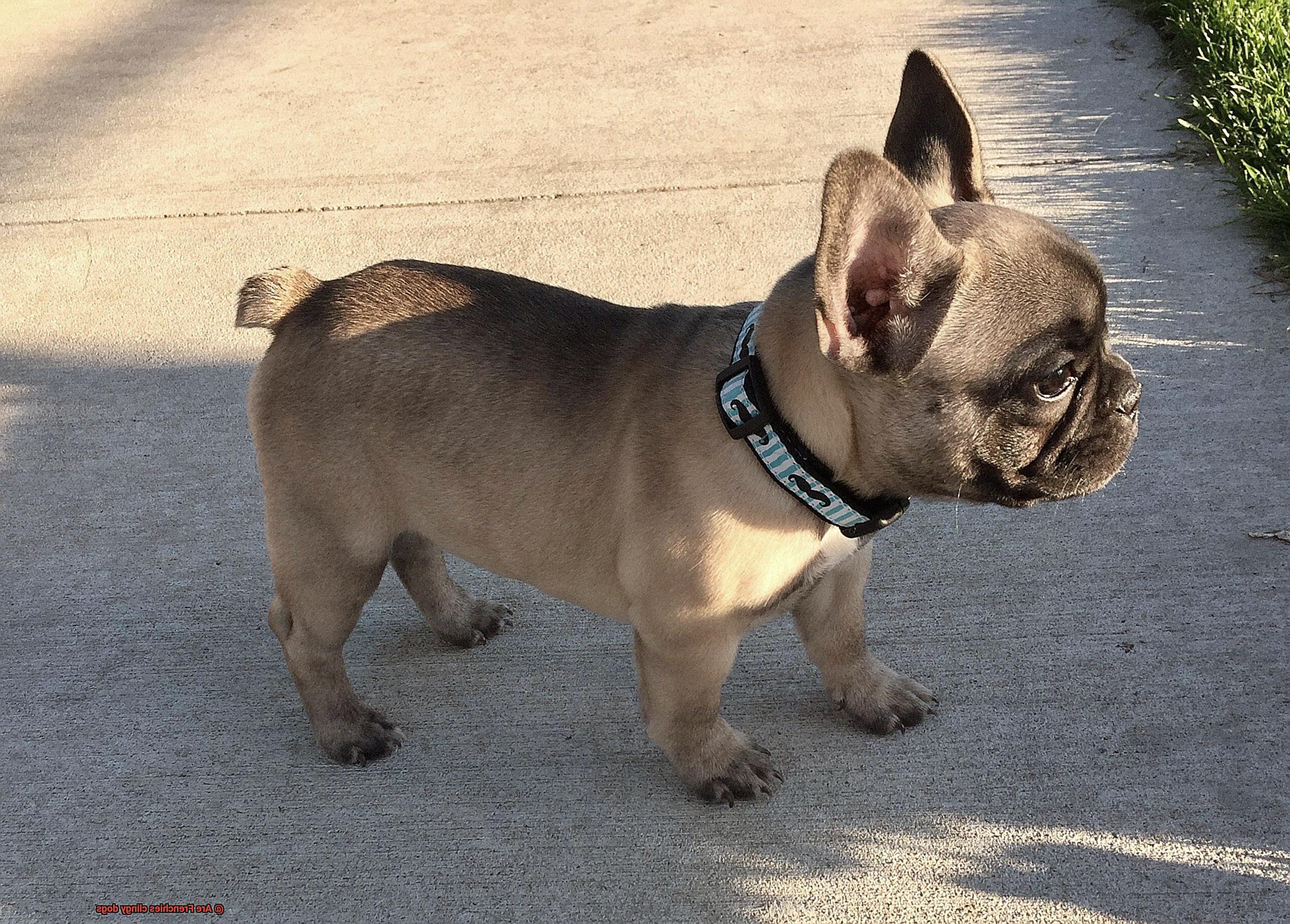
Mental Stimulation: Engaging Their Intelligent Minds
- Challenging activities: Frenchies benefit from engaging activities that challenge their minds and prevent boredom.
- Puzzle toys and interactive games: These provide mental stimulation while keeping them entertained.
- Obedience training: Teaching your Frenchie new tricks not only keeps them mentally sharp but also strengthens your bond.
- Canine sports: Agility or nose work can keep their minds engaged and satisfied.
Scent Work: Utilizing Their Exceptional Sense of Smell
- Scent games at home: Set up simple scent games by hiding treats or toys for them to find. This exercises their olfactory senses and keeps them mentally engaged.
- Snuffle mats or scent trails: These are great tools for providing mental stimulation while tapping into their natural instincts.
Individual Considerations:
- Tailor activities to your Frenchie: Each Frenchie is unique, and their exercise and mental stimulation needs may vary. Consider factors such as age, health condition, and individual temperament.
- Seek guidance: Consulting with a veterinarian or professional dog trainer can help you create a personalized exercise and mental stimulation plan for your Frenchie.
Establishing Boundaries and Routines for Your Frenchie

Without proper boundaries and routines, their clinginess can become overwhelming. In this blog post, we will explore how establishing boundaries and routines can help build a strong bond between you and your Frenchie.
Setting Boundaries:
- Teach commands such as “stay” or “go to your bed” to establish personal space.
- Reward your Frenchie when they respect your boundaries.
- Consistency is key in ensuring they understand and respect these boundaries.
Basic Obedience Training:
- Teach commands like “sit,” “stay,” and “come” to provide structure and ensure their safety.
- An obedient Frenchie is more likely to follow boundaries and instructions.
Establishing a Routine:
- Dogs thrive on routine and knowing what to expect throughout the day.
- Set specific times for feeding, walks, playtime, and rest.
- This routine helps your Frenchie feel secure and reduces anxiety or restlessness.
Mental Stimulation:
- French Bulldogs are intelligent dogs that need mental exercise along with physical exercise.
- Incorporate puzzle toys, training sessions, and interactive games into their daily routine.
- This keeps their minds sharp and prevents boredom.
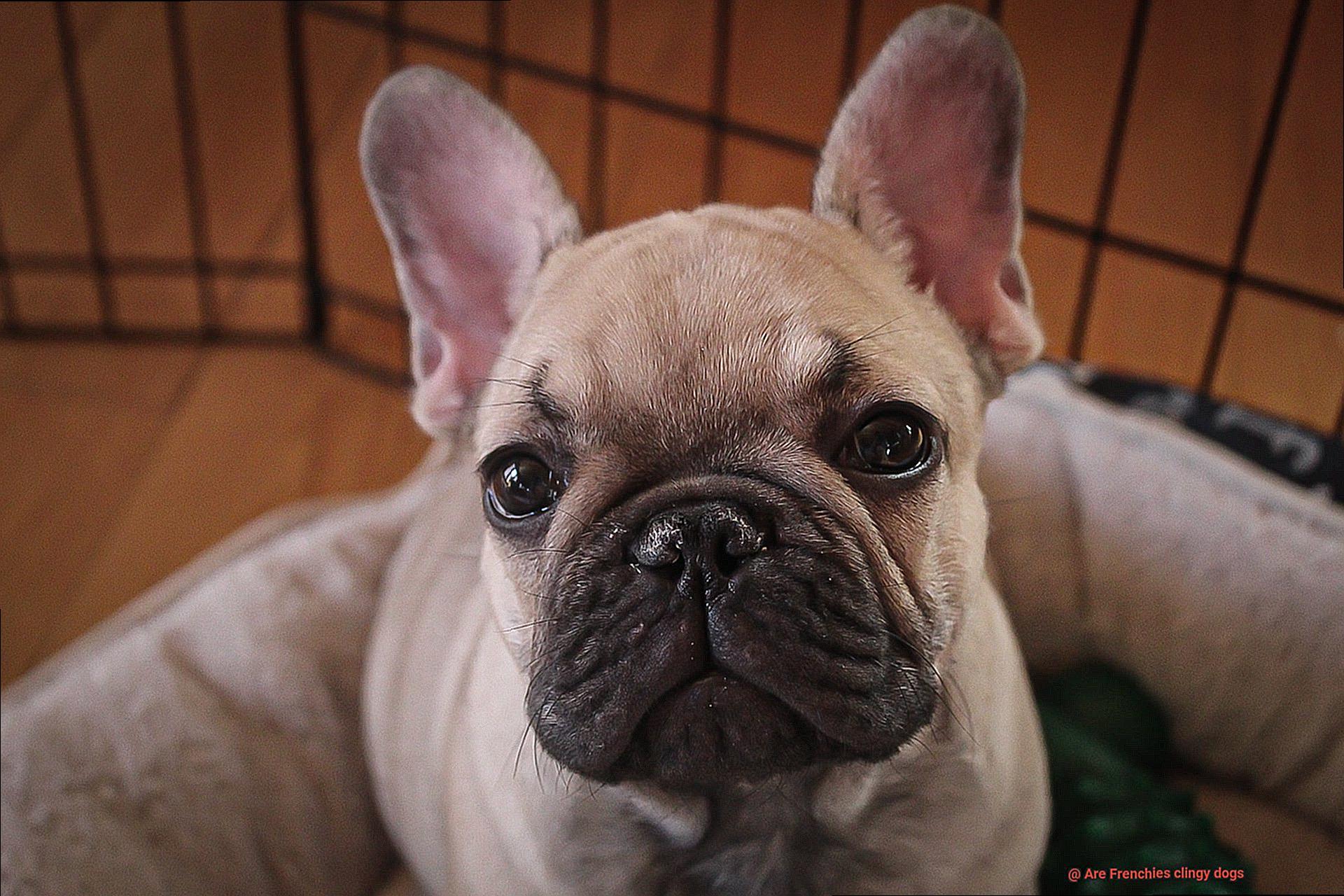
Consistency:
- Stick to the rules you set and ensure everyone in the household follows them.
- Consistency helps your Frenchie understand what is expected of them.

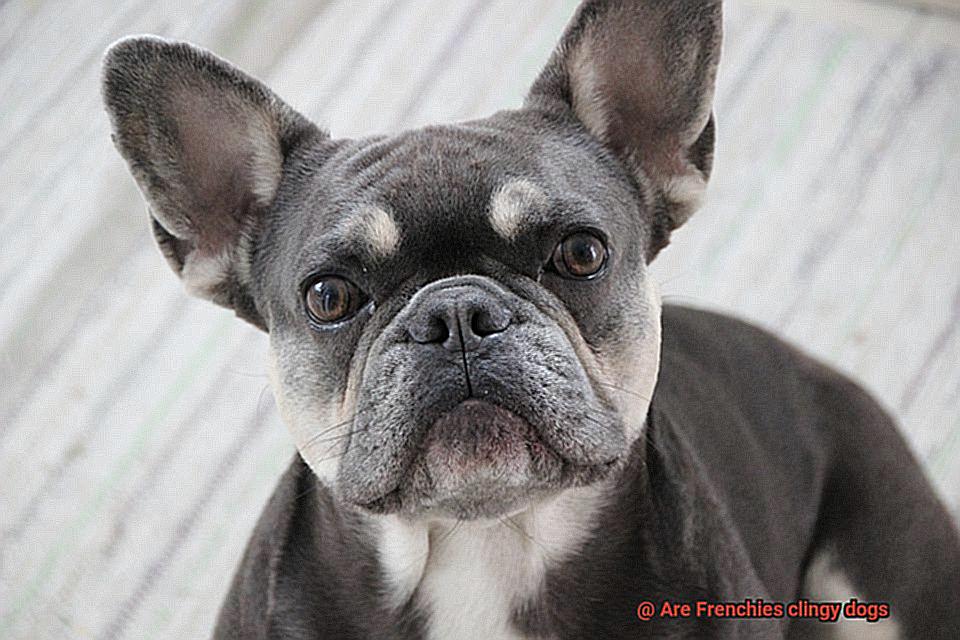
Patience and Understanding:
- Be patient as your Frenchie learns and adjusts to the boundaries and routines.
- Use positive reinforcement and rewards to encourage good behavior.
- This builds a strong bond based on trust and mutual understanding.
Understanding the Causes of Clinginess in French Bulldogs
French Bulldogs are adorable and affectionate dogs, known for their loving nature. However, some Frenchies can display clingy behavior that goes beyond normal levels of affection. In this blog post, we will explore the various factors that may contribute to clinginess in French Bulldogs, helping you understand your furry friend better.
Separation Anxiety:
Separation anxiety is a common cause of clinginess in French Bulldogs. These dogs can become anxious and distressed when left alone, leading them to exhibit clingy behavior when their owners are present. Changes in routine, rehoming, or traumatic events can trigger separation anxiety.
Lack of Socialization:
French Bulldogs that have not been properly socialized may feel more dependent on their owners for security and comfort, leading to clinginess. Early exposure to different people, animals, and environments is crucial for their development and helps them become more confident and independent.
Inadequate Mental and Physical Stimulation:
French Bulldogs are active and intelligent dogs. Without sufficient mental and physical exercise, they can become bored and seek constant attention from their owners. This boredom-driven clinginess can be alleviated by providing mental stimulation through puzzle toys and engaging in regular physical exercise.
Health Issues:
Certain health conditions can contribute to clinginess in French Bulldogs. If your Frenchie is in pain or discomfort due to an underlying medical condition, they may seek extra comfort and attention from you. Regular veterinary check-ups are essential to identify and address any health issues promptly.
Individual Temperament:
Just like humans, dogs have unique personalities and temperaments. Some French Bulldogs may naturally have a more independent nature, while others may have a strong attachment to their owners. Understanding and accepting these individual differences can help you manage and address clinginess effectively.
How to Create a Harmonious Relationship with Your Clingy Frenchie
With the right approach, you can create a harmonious relationship with your clingy Frenchie that allows both of you to thrive. In this article, we will explore some strategies to help you establish boundaries, provide mental and physical stimulation, and promote independence in your beloved pet.

Set Clear Boundaries and Establish a Routine:
Frenchies thrive on structure, so it’s important to set clear boundaries and establish a routine for your Frenchie. Create a consistent schedule for feeding, exercise, and playtime. This will help them understand what is expected of them and reduce any anxiety or clinginess they may exhibit.
Provide Mental and Physical Stimulation:
To keep your Frenchie engaged and prevent excessive clinginess, provide them with mental and physical stimulation. Engage them in interactive games, puzzle toys, or training sessions to keep their minds occupied. Regular exercise is also crucial to release their pent-up energy and prevent them from becoming overly clingy.
Socialize Your Frenchie:
Introduce your Frenchie to various environments, people, and other animals from an early age. This will help them develop confidence and reduce separation anxiety. Enroll them in obedience classes or organize playdates with other dogs to enhance their social skills.
Shower Them with Love, but Avoid Reinforcing Clingy Behavior:
It is essential to ensure that your Frenchie feels secure and loved. Spend quality time with them, provide plenty of positive reinforcement, and shower them with affection. However, avoid reinforcing clingy behavior by giving in to their demands every time. Instead, reward independent behavior and gradually increase the time spent apart.
Implement Crate Training:
Implementing crate training can be beneficial in reducing clinginess. A crate provides a safe and comfortable space for your Frenchie when you are not around. Start by leaving them in the crate for short periods while gradually increasing the time. This will help them feel secure even when you are not present.
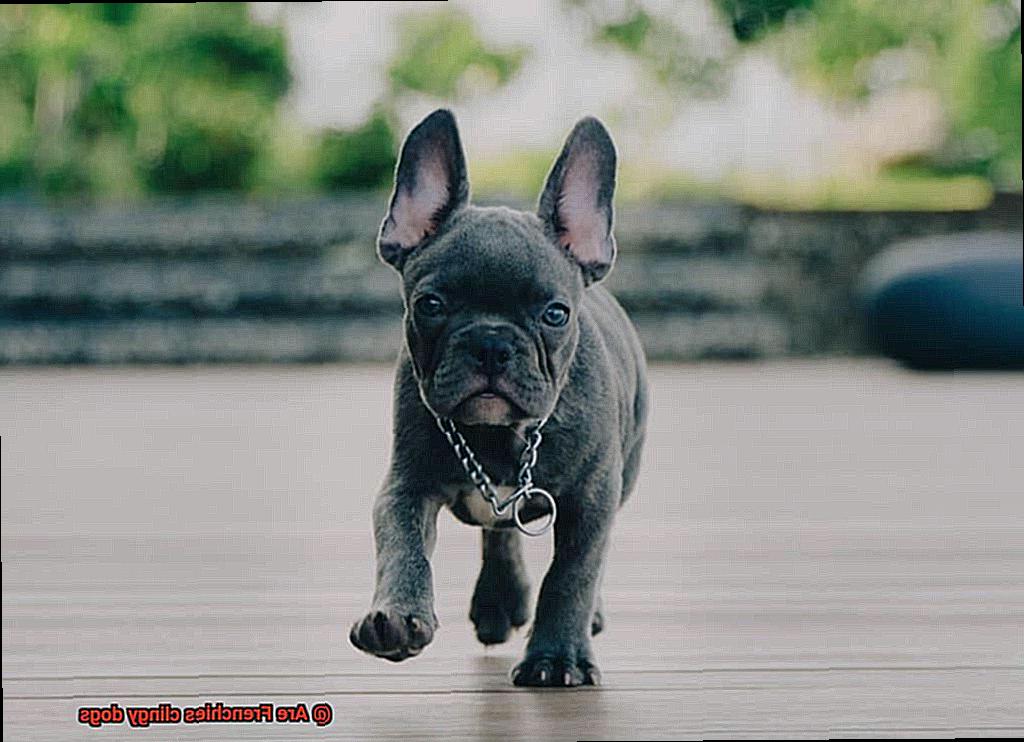
Not All Frenchies are Clingy – Each Dog Has Its Own Unique Personality
When it comes to French Bulldogs, they often get a bad rap for being clingy or needy. But as any Frenchie owner knows, each dog has its own unique personality, just like us humans. So, it’s important to understand that not all Frenchies are clingy, and generalizing the behavior of an entire breed can be misleading.
Factors such as upbringing, socialization, and individual experiences greatly influence a Frenchie’s behavior. Dogs that have been properly trained and socialized from a young age are more likely to exhibit balanced behavior and have a healthier sense of independence. So, if your Frenchie is on the clingier side, it might be worth considering their background and experiences.
To foster a strong bond with your Frenchie, regardless of their natural tendencies, it’s crucial to spend quality time with them. This means providing them with attention, exercise, mental stimulation, and plenty of love and affection. Building this bond will help create trust between you and your furry friend.
However, it’s also essential to respect your Frenchie’s boundaries. Just like any other living being, dogs need their personal space at times. So, don’t force constant attention or physical contact if your Frenchie isn’t comfortable with it. Give them the space they need and allow them to come to you when they’re ready.
It’s also worth noting that some French Bulldogs may exhibit clingy behavior due to separation anxiety or other underlying issues. If you notice excessive neediness or distress when leaving your Frenchie alone, it might be best to consult with a professional dog trainer or veterinarian. They can help address any underlying issues and provide guidance on how to help your Frenchie feel more secure and independent.
ePdgri4-v8c” >
Conclusion
In conclusion, it is safe to say that Frenchies are indeed clingy dogs.
They have a strong desire for companionship and thrive on human interaction. These adorable little pups will follow you around the house, snuggle up in your lap, and shower you with affection.
They crave attention and can become anxious or distressed when left alone for long periods of time. So if you’re looking for a furry friend who will be by your side every step of the way, a Frenchie might just be the perfect match for you.
Their loyalty and devotion are unmatched, making them one of the most clingy yet lovable breeds out there.




